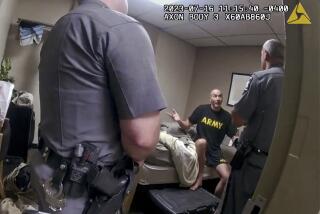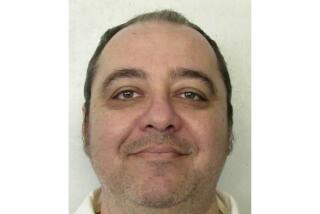Hypnosis evaluation sought for sergeant accused in Iraq killings
JOINT BASE LEWIS McCHORD, Wash. — Attorneys for Sgt. John Russell asked a military judge Monday for permission to hire an expert in hypnosis to help the veteran of three combat tours remember what happened on the day he is alleged to have shot and killed five fellow soldiers at a combat stress clinic in Iraq.
The defense also hopes to contract with a brain imaging expert to measure signs of atrophy detected in the 48-year-old sergeant’s brain to determine whether a previous brain injury could have impeded his ability to control his impulses on May 9, 2011, when Russell is accused of grabbing a colleague’s gun, returning to the clinic and opening fire.
Army prosecutors are seeking the death penalty, despite an earlier investigating officer’s finding that Russell had “an undisputed mental disease or defect” that made capital punishment inappropriate.
Russell, wearing a dress green uniform and speaking only when asked a question, was arraigned in a military courtroom on five counts of murder, one count of attempted murder and one count of aggravated assault. His court martial is tentatively set for March.
James Culp, Russell’s civilian defense attorney, said forensic psychiatrist Robert L. Sadoff, who has conducted a lengthy evaluation for the defense, has said it would be helpful to engage an expert in hypnosis to help Russell remember the events that led up to the shooting. Russell claims he has only a hazy memory of those events.
In testimony Monday, David Spiegel of the Stanford University medical school, an expert in forensic hypnotism, said it is often possible to recover during hypnosis memories lost as a result of psychic trauma.
Prosecutors have objected, presenting other testimony that suggested such recovered memories are often inaccurate, but Spiegel rejected the idea that any such information gleaned is inherently “unreliable.”
“I would have said that it is not a truth serum. The quality produced by hypnotism is sometimes no better but certainly no worse other methods of examination,” he testified.
Monday’s motions suggest the defense is likely to argue that Russell was too mentally ill to be responsible for the shootings. Culp and his co-defense counsel, Lt. Col. Darrel Vandeveld, said there is substantial evidence that the sergeant was suffering from prolonged depression tinged with psychotic episodes.
But instead of receiving help, they said, Russell on the morning of the shootings was ridiculed and yelled at by a psychiatrist at the combat stress clinic where he had sought help.
According to court documents and testimony, a psychiatrist at the clinic brushed off Russell’s threat to kill himself if he didn’t get help, and then angrily followed him as the sergeant left the clinic.
Sadoff, director of the forensic psychiatry fellowship program at the University of Pennsylvania School of Medicine, who has evaluated more than 10,000 criminal cases during his career, laid blame squarely in the Army’s court in an evaluation he wrote to the court in September.
“I can say, very clearly, that I have never seen a case such as this one where the defendant was provoked to violence by the ineptitude and lack of compassion of two of my colleagues, who were assigned to evaluate and treat Sgt. Russell while he was in an acute state of depression, with suicidal intent, while on active duty in Iraq,” he wrote.
“The manner in which he was treated by [a] professional psychologist and psychiatrist was inexcusable and, in my opinion, provoked the violence that Sgt. Russell expressed when he shot and killed five Americans in Iraq,” he said.
In motions Monday, defense counsel sought to have the government pay for retired Brig. Gen. Stephen Xenakis, a former psychiatric advisor to the Army surgeon general, to analyze and testify about the standard of care at the clinic.
Defense lawyers say testimony at Russell’s pretrial hearing revealed that there was no regular clinical oversight of camp psychiatrists and no regular meetings to discuss acute care.
“We submitted statements from two MPs saying [Russell’s doctor] followed him out of the clinic and was shouting at him,” despite Russell’s history of depression and psychotic tendencies, Vandeveld said. “If that is the standard of care, the inquiry ends there.”
But Capt. Patrick Scudieri, part of the prosecution team, said expert testimony on how the clinic operated was not relevant to the issue of what happened with Russell on that day.
“Whether or not the combat stress clinic was the best one or the worst one … it has nothing to do with how the combat stress clinics in general are run,” he said.
ALSO:
Big spike in police killings in 2011, then a drop in 2012
Indianapolis house explosion becomes a homide investigation
Mustang Ranch: Nevada brothel owner elected county commisisoner
More to Read
Start your day right
Sign up for Essential California for news, features and recommendations from the L.A. Times and beyond in your inbox six days a week.
You may occasionally receive promotional content from the Los Angeles Times.





